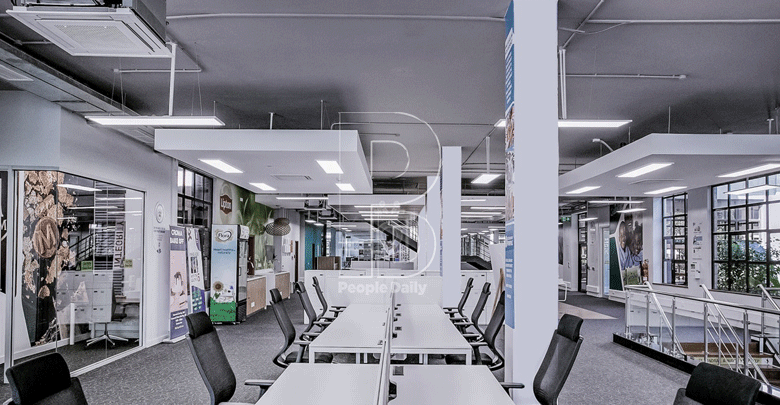Serviced offices get higher occupancy in Nairobi area
By Christopher Owuor, April 29, 2021As a way of working, the concept of fully-equipped pay-as-you-use office space has never stood stronger. The offices recorded higher yields than their unserviced counterparts, according to a new Nairobi Metroplitan Area survey by a leading real estate company.
Milliam Murigi @millymur1
As leased offices in Nairobi Metropolitan Areas (NMA) continue to experience reduced occupancy rates, serviced offices in the same area continue to attract more occupants, a new report by Cytonn Real Estate has revealed.
Dubbed Nairobi Metropolitan Area Commercial Office Report 2021, the report reveals that serviced offices are becoming a trend in the modern market as they provide flexibility with no significant upfront capital expenditure.
For the office owners, serviced offices yield higher returns compared to unserviced ones.
According to the report, serviced offices in the NMA are attracting between Sh204 to Sh105 in revenue per square feet while unserviced offices attract between Sh106 and Sh73 in revenue.
“Because of the better yields, we expect to see more developers venturing into this sector of serviced offices, which have the potential now and in the near future,” reads part of the report.
Speaking during the launch of the report recently, Effie Otieno, Real Estate Research Coordinator at Cytonn said that in addition, the popularity of co-working office spaces is picking up as they are offering companies spaces on flexible terms.
In 2020, the report shows serviced offices recorded yields of 11.2 per cent, 4.2 per cent points higher than the unserviced offices’ yield of seven per cent.
This is attributed to the attractiveness of the office setup for small businesses, start-ups, and freelancers due to flexibility of the leases, no set-up costs required, and, opportunities for collaboration with other individuals/businesses in a competitive working environment.
Worst performing areas
Westlands and Karen were the best performing nodes recording rental yields of 15.9 per cent and 14.8 per cent, compared to 7.6 per cent and 7.8 per cent for unserviced offices respectively in the same areas.
“Last year, serviced offices recorded an occupancy rate of 81.2 per cent in Westlands, while their counterparts (non serviced) recorded a 79.9 per cent occupancy rate,” says Effie adding that this is a clear indication that demand for serviced offices is higher in some areas.
The worst performing areas when it comes to serviced offices were Mombasa and Thika Road where occupancy level remained low at 50 per cent and 52.5 per cent respectively.
The low demand, however, hasn’t affected the yield with serviced offices recording yields of seven per cent and 6.6 per cent respectively with unserviced offices recording yields of 4.8 per cent and 5.8 per cent respectively.
“For serviced offices, opportunity lies in zones with low supply and in new markets, such as county headquarters with low supply of office space.
New markets to invest in are Gigiri and Parklands that have continued to perform well amid the relaxation of zoning regulations paving way for development of office spaces as these are regarded as residential zones,” she adds.
She says Covid-19 has driven demand higher for serviced offices as companies want more flexible short-term leases due to economic concerns rather than being locked into a high-cost contract over a long period of time as well as others seeking additional premises to support social distancing.
Increasing start-ups and SMEs
Globally, serviced offices industry is anticipated to continue expanding over the next five-year period as more companies opt for the flexibility and increasing suitability of serviced offices.
A study by The Business Research Company shows that, the global serviced office market is expected grow from $27 billion (Sh2.9 trillion) in 2020 to $32.9 billion (Sh3.4 trillion) in 2021 at a compound annual growth rate (CAGR) of 21.9 per cent.
The growth is mainly due to the companies resuming their operations and adapting to the new normal while recovering from the Covid-19 impact.
According to the study, demand for serviced offices will always be there because of the ever-growing number of start-ups and Small and Medium Enterprises (SMEs), which are primarily contributing to the growth of serviced offices.
Also increased government support and funds for startups and SMEs boost the demand for the serviced office market.
Since start-ups and SMEs don’t have the funds to tie down on furniture and partitioning and time to engage in sourcing and designing the office, most of them move in serviced offices or co-working spaces.
According to the World Bank, there are 400 to 500 million SMEs and startups across the globe and the number is increasing day by day due to extensive support by the government.
Meanwhile, the same report notes that NMA commercial office market generally in 2020 faced numerous challenges attributable to the Covid-19 pandemic, which brought about reduced demand for office space as well as the high supply, which led to declines in both rental rates and occupancies.
The sector also saw an increase in the oversupply from 6.3 million square feet in 2019 to 7.3million square feet in 2020.
This office supply is expected to increase going forward with few developments in the pipeline with another expected 0.9 million square feet of space expected in 2021 from developments, such as Global Trade Centre in Westlands, Riverside Square in Riverside, China Road and Bridge Corporation in Lang’ata.
“Last year there was reduced demand for office space in the Nairobi NMA evidenced by the 1.3 per cent year-over-year decline in the average occupancy rates mainly attributable to an oversupply.
However, investment opportunity lies in differentiated concepts such as serviced offices, which offer higher yields,” says the report.
